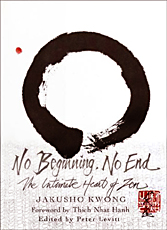Jakusho Kwong is a successor in the lineage of Shunryu Suzuki-roshi. He has been teaching Zen in the United States and Europe for more than 30 years. He is the founder and abbot of the Sonoma Mountain Zen Center. In 1995, he was given the title of Dendo Kyoshi, Zen teacher, by the Soto School in Japan. He is one of nine Western Zen teachers to receive this acknowledgement. This collection of his talks has been edited by Peter Levitt, a poet who has been practicing Zen for many years under Jakusho Kwong.
In this wonderful passage, Levitt clarifies the powerful impact of seasoned spiritual teachers: "True Zen masters live through and through. You can see it in the way they pour tea, place their shoes together outside the meditation hall, walk down the road. You can feel the presence of their intimacy with all things in their undivided way of engaging in any activity their daily lives may bring. There is a vitality in their manner of speaking and in their gestures, no matter how small, that makes it seem like the whole of life has just entered the room. And it has. Jakusho Kwong-roshi says this is Zen. It is not something special, to be found exclusively in the meditation hall, but rather it is the aliveness we bring to our everyday lives, the aliveness that is already present within us waiting to emerge."
This message is one that we all need to hear and to take to heart. The ancient Zen master Dogen said that enlightenment is just intimacy with things. That perspective enables Kwong to savor the pleasures of picking up the garbage in the monastery (see the excerpt). Nothing is too ordinary or unimportant to be ignored.
This Zen master does a fine job clarifying various central terms in Buddhism. For instance, he salutes renunciation not as turning our backs on the world, but "turning our back on the conditions that cause suffering — greed, anger, and ignorance — and rediscovering our natural confidence through seated meditation." Then there is that tricky term "faith" which is one of the four legs of practice. Kwong states: "Faith is not an idea, it is something that is proven over and over again through your physical practice until it seeps into your body. Dogen called it our 'faithlike body,' which is exactly right." Although Webster's dictionary makes "vow" into a dreary and solemn affair, Kwong sees it as a liberating force that enables us through steadfast awareness and intention to change the course of our lives.
Perhaps the most startling gem in the entire book is the following: "Dharma students, and especially Zen students, use the term practice a great deal. I feel it's overused, but Dogen defined practice as giving life to your original self. This is not giving life to your deluded self, which we do all the time, but to your original self, to your basic goodness, or you could say to your Buddha Nature, which each one of us intrinsically possesses whether we realize it or not. This is the word practice. It can be understood in a very oceanic way or in a very shallow way, but still practice is always practice, and its truth is to ignite and reveal your true self within your everyday life."
This reframing of the term practice really hits the mark. It means that practices can be shared across religious traditions since they all emerge from the same impulse: to draw out the best that is within us, whether that is seen as our Buddha nature, the true self, the image of God, or the highest self. It is this understanding of practice which enables Kwong to cherish the following vignette from the life of Suzuki-roshi. He would buy the old vegetables when he went to the market because otherwise those vegetables would be thrown away and no one would eat them.
